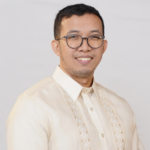Keynote speakers
 John Jamir Benzon R. Aruta, PhD, is an Associate Professor at De La Salle University, Manila, Philippines. His research program focuses on: (1) applying psychological principles to promote environmental sustainability, (2) examining the interface between climate change and mental health in Global South contexts, (3) advancing planetary health scholarship, and (4) addressing the mental health needs of neglected and marginalized populations. He is the inaugural Director of the Sustainability Psychology and Planetary Health Research Laboratory (SPPHERE Lab), a community of environmentally engaged students and professionals working on research, advocacy, community building, and policy collaboration. Beyond academia, Dr. Aruta is an active clinical practitioner, providing mental health assessment, counselling, and psychotherapy for children, adolescents, and early adults. He was awarded Outstanding Young Scientist in 2023 by the National Academy of Science and Technology.
John Jamir Benzon R. Aruta, PhD, is an Associate Professor at De La Salle University, Manila, Philippines. His research program focuses on: (1) applying psychological principles to promote environmental sustainability, (2) examining the interface between climate change and mental health in Global South contexts, (3) advancing planetary health scholarship, and (4) addressing the mental health needs of neglected and marginalized populations. He is the inaugural Director of the Sustainability Psychology and Planetary Health Research Laboratory (SPPHERE Lab), a community of environmentally engaged students and professionals working on research, advocacy, community building, and policy collaboration. Beyond academia, Dr. Aruta is an active clinical practitioner, providing mental health assessment, counselling, and psychotherapy for children, adolescents, and early adults. He was awarded Outstanding Young Scientist in 2023 by the National Academy of Science and Technology.
Peer Regulation of Stress Physiology: Implications for Adolescent Development
 Matteo Giletta is Associate Professor of Developmental Psychology at Ghent University. His research focuses on adolescence, with a particular emphasis on the role of stress and social relationships, especially peer interactions, in adolescents’ psychosocial development. A central goal of his work is to investigate the interplay between psychological and physiological processes to better understand health risks during adolescence. His research involves school-based studies employing a range of methodologies, including intensive and long-term longitudinal designs, standardized laboratory stress paradigms, and assessments of multiple biological processes (e.g., cortisol, inflammation).
Matteo Giletta is Associate Professor of Developmental Psychology at Ghent University. His research focuses on adolescence, with a particular emphasis on the role of stress and social relationships, especially peer interactions, in adolescents’ psychosocial development. A central goal of his work is to investigate the interplay between psychological and physiological processes to better understand health risks during adolescence. His research involves school-based studies employing a range of methodologies, including intensive and long-term longitudinal designs, standardized laboratory stress paradigms, and assessments of multiple biological processes (e.g., cortisol, inflammation).
Adolescent mental health in the 21st century: How to explain time trends and social inequalities across countries
 Gonneke Stevens is Professor Adolescent Health and Wellbeing at the department of Interdisciplinary Social Science at Utrecht University, the Netherlands. Her research focuses on whether and why adolescent health and wellbeing varies as a function of proximal and more distal contexts. These contexts include the family, peer, school, neighborhood and the country in which adolescents grow up in. Moreover, she examines time trends and social inequalities in adolescent (mental) health. She investigates this by using complementary methods: large-scale, cross-sectional, internationally comparative research, longitudinal research, experimental and qualitative (participatory) research.
Gonneke Stevens is Professor Adolescent Health and Wellbeing at the department of Interdisciplinary Social Science at Utrecht University, the Netherlands. Her research focuses on whether and why adolescent health and wellbeing varies as a function of proximal and more distal contexts. These contexts include the family, peer, school, neighborhood and the country in which adolescents grow up in. Moreover, she examines time trends and social inequalities in adolescent (mental) health. She investigates this by using complementary methods: large-scale, cross-sectional, internationally comparative research, longitudinal research, experimental and qualitative (participatory) research.
Young Activists, Advocates, and Allies: Examining Adolescents’ Critical Political Development
 Laura Wray-Lake is a Professor of Social Welfare in the Luskin School of Public Affairs at the University of California, Los Angeles. Dr. Wray-Lake’s research focuses on civic engagement during adolescence and young adulthood. She has written and contributed to over 100 articles and chapters on various topics including young people’s community service, political action and activism, critical consciousness, identity, decision-making, school and community experiences, and anti-racism.
Laura Wray-Lake is a Professor of Social Welfare in the Luskin School of Public Affairs at the University of California, Los Angeles. Dr. Wray-Lake’s research focuses on civic engagement during adolescence and young adulthood. She has written and contributed to over 100 articles and chapters on various topics including young people’s community service, political action and activism, critical consciousness, identity, decision-making, school and community experiences, and anti-racism.

